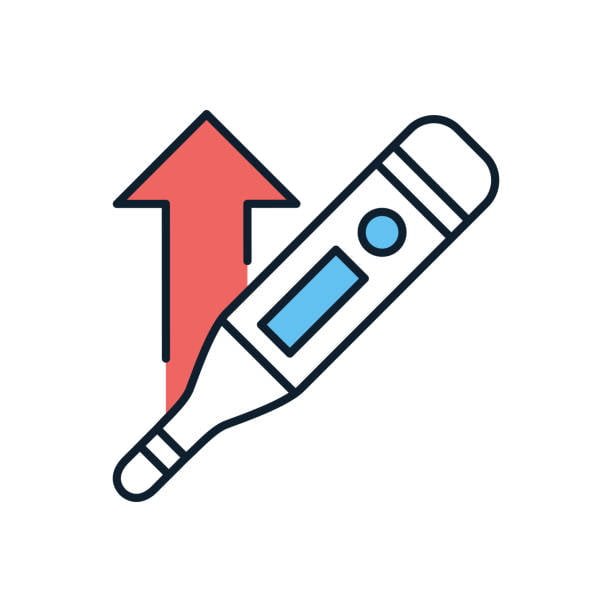Febrile Convulsions
Introduction
Febrile convulsions, also known as febrile seizures, represent one of the most common neurological disorders in children aged six months to five years. Febrile convulsions represent the leading cause of seizures among children, affecting approximately 1 in 20 children.
Aetiology & Risk Factors
The exact cause of febrile convulsions isn’t fully understood. Febrile convulsions, common in young children during rapid fever spikes, are likely due to a combination of genetic predisposition, immature nervous systems, and the body’s response to infections. Approximately 80% of febrile seizures stem from viral infections, with human herpesvirus 6 and influenza being the most prevalent. Febrile convulsions are usually benign and do not cause any long-term harm.
Febrile convulsions can be influenced by several risk factors although 50% of children that have febrile convulsions have no identified risk factors.
Genetic Predisposition
Family history of febrile seizures increases the likelihood of a child experiencing them.
Age
Children between 6 months and 5 years old are most susceptible, particularly during their first febrile illness.
Temperature
Sudden increases in body temperature, often due to infections, raise the risk.
Previous Episodes
Children who have experienced febrile convulsions previously are at higher risk of recurrence.
Infections
Children frequently exposed to infections, especially viral ones, are more prone to febrile seizures.
Types Of Febrile Convulsions
Prevalence: Around 80-85% of febrile convulsions are simple
Duration: Typically last less than 15 minutes, although most last less than 5 minutes
Generalised Seizure: Involve symmetric, generalised tonic-clonic movements affecting both sides of the body. Incontinence, eye movements and tongue biting may also be present during the episode.
Single Occurrence: Usually occur only once within a 24-hour period during the same febrile illness episode.
Recovery: Can quickly return to their normal state once the convulsion ends with the post-ictal phase often lasting less than one hour. Following a simple febrile seizure, children who quickly recover and show no other concerning symptoms typically do not require any further investigations.
Prolonged post-ictal state may suggest nervous system infection
Prevalence: Around 15-20% of febrile convulsions are complex
Duration: Typically last longer than 15 minutes or involve multiple seizures within a 24-hour period.
Variable Seizures: Seizures may manifest with focal neurological deficits, such as weakness on one side of the body, or exhibit atypical features such as partial (focal) seizures.
Single Occurrence: Complex febrile seizures may recur during the same illness episode.
Recovery: The child may experience prolonged confusion or altered consciousness (post-ictal) following the seizure.
Febrile status epilepticus is defined as either a seizure lasting over 30 minutes or multiple seizures occurring without recovery.
Management
Seizure Management
By the time medical assistance arrives, most seizures would have typically resolved. See seizure management here.
Post Seizure Management
The primary focus of clinical assessment after a simple febrile seizure should be directed towards identifying the origin of the fever in the child. Identification of life-threatening causes such as meningitis should be considered.
Manage the fever with appropriate antipyretic medications (e.g., paracetamol or ibuprofen) following dosing guidelines based on the child’s weight and age.
Parental Advice
Parents may experience significant distress after witnessing a febrile seizure.
It’s crucial to provide explanations regarding the benign nature of febrile seizures, differentiate between febrile seizures and epilepsy, discuss the likelihood of a child experiencing another febrile seizure, and outline the typical progression of febrile seizures over time.
Differentials
Differential diagnoses for febrile seizures include:
Epileptic Seizures: Febrile seizures need to be distinguished from epileptic seizures, which can occur without fever and may have different characteristics.
Non-febrile Seizures: Seizures triggered by factors other than fever, such as epilepsy or metabolic disturbances.
Infections of the Central Nervous System (CNS): Meningitis, encephalitis, or other CNS infections can present with seizures, fever, and other neurological symptoms.
Metabolic Disorders: Disorders such as hypoglycemia, electrolyte disturbances, or inborn errors of metabolism can manifest with seizures during episodes of fever.
Toxic Ingestions: Ingestion of certain toxins or medications can lead to seizures, although fever may not always be present.
Traumatic Brain Injury: Head trauma may lead to seizures, especially in the context of fever.
Syncope: Fainting episodes due to decreased blood flow to the brain can mimic seizures but typically do not occur with fever.
Key Points
-
Febrile convulsions are seizures that occur in children typically between 6 months and 5 years old, often associated with a rapid rise in body temperature due to infections.
-
They are generally brief, lasting for a few seconds to a few minutes, and involve generalized tonic-clonic movements.
-
Febrile convulsions are usually benign and do not cause long-term neurological damage, but they can be alarming for caregivers to witness.
-
Management involves ensuring the child’s safety during the seizure, managing fever with antipyretic medications, and educating caregivers about the nature of febrile convulsions and their management.

Bibliography
CKS is only available in the UK. (n.d.). NICE. https://cks.nice.org.uk/topics/febrile-seizure
Febrile convulsions in children. (n.d.). Kingston Hospital. https://kingstonhospital.nhs.uk/information/febrile-convulsions-in-children
NHS. (2017, October 18). Febrile Seizures. Nhs.uk. https://www.nhs.uk/conditions/febrile-seizures


